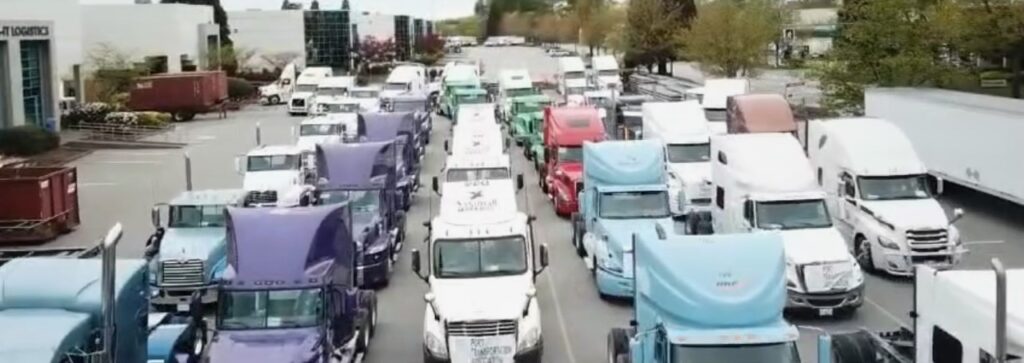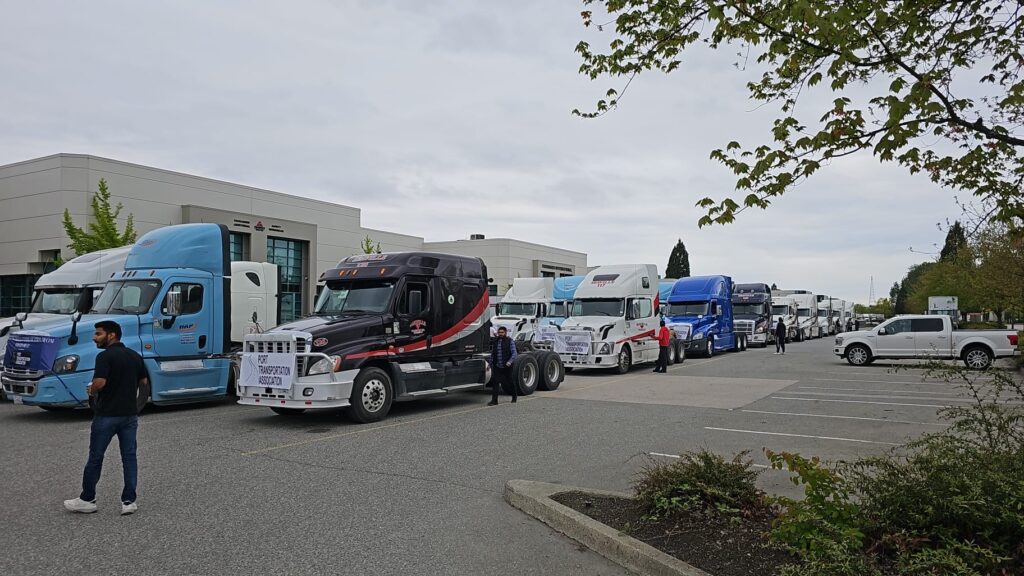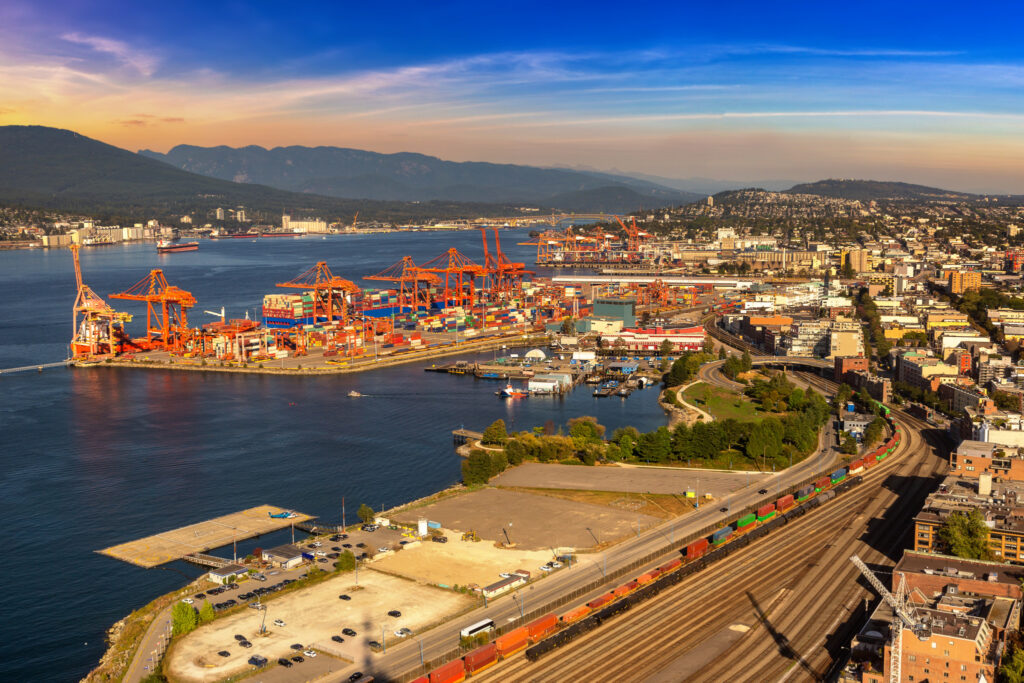Trucker Access › Forums › Diesel News › New licensing rules spark truck convoy to Vancouver port
- This topic has 0 replies, 1 voice, and was last updated 9 months, 3 weeks ago by
 EazyRiDer66.
EazyRiDer66.
-
AuthorPosts
-
May 9, 2024 at 4:15 pm #19293
 EazyRiDer66Keymaster
EazyRiDer66KeymasterMore than 100 container truck drivers from the Lower Mainland held a rolling convoy from Delta, B.C., to a Vancouver port on May 5, to protest against the new container trucking service requirements that they believe will harm smaller and medium drayage companies in the area.
To renew their truck tags (licences to haul containers to and from the port) this November, licensees “must not enter into an agreement, arrangement or understanding” to perform on- or off-dock trucking services with any non-licence holders, who perform off-dock drayage work in the Lower Mainland. That according to a report published by the Office of the British Columbia Container Trucking Commissioner (OBCCTC) on May 2. There are currently approximately 1,600 issued tags, distributed among 74 trucking companies.

(Photo: PTA) Commissioner Glen MacInnes says the decision is aimed at closing loopholes for “shadow companies” in Lower Mainland that allowed them to bypass regulated wage standards for truck drivers hauling the port’s containers.
Historically, he says, a licensed trucking company could transfer a container at an off-dock facility to a non-licensee, which would complete the delivery without having to pay drivers the regulated rate. Changes were introduced in 2022.
“Then, what we were finding was [that] some licensees would arrange it the other way around, where they made the non-licensee the primary shipper and then contracted that back to the licensee. So, it was a bit of a loophole that didn’t achieve what we wanted.”
Tom Johnson, spokesperson for the Port Trucking Association, which organized the Sunday rally, says the requirement will do more harm than good, by pushing small and mid-sized companies that have non-licensed parts of their businesses — including longhaul trucking operations — out of the business and out of the province.
“We are going to have the highest-paid unemployed drivers in Canada,” Johnson says.

(Photo: PTA) He adds PTA – which claims to represent nearly half of the licence holders – believes that the changes were unnecessary, citing the previous Commissioner’s 2021 off-dock drayage consultation report that concluded that the off-dock activity conducted on behalf of licensees was not significant.
MacInnes, however, says in his tenure, through the collaboration with Commercial Vehicle Safety and Enforcement, he learned the scope of the issue was bigger than previously thought.
“I get calls from other licensees who complain about other licensees who are doing this… It’s not just an isolated issue,” he adds. “I don’t know if [it] increased or we’ve noticed it more because we’re out there in the field actively enforcing it.”
Exclusive port work
MacInnes explains the Container Trucking Act was designed to create a system where only certain companies are granted exclusive access to the port in exchange for agreeing to pay regulated rates when moving containers.
This is why in his OBCCTC report, he told drayage companies to make a ‘fundamental business decision’ regarding the importance of marine terminal access for their operations. MacInnes also noted companies also have an option of only performing off-dock work.
But PTA’s Johnson says this will prevent many companies from “doing business with themselves” as the requirements prohibit licensed trucking companies from using their subsidiary or associated non-licensed companies to perform off-dock work.
He also argues truck drivers need to perform both types of jobs to ensure stability and consistency in their income, adding this also allows companies to maintain continuous operations, regardless of fluctuations in port traffic.

(Photo: iStock) “If you only [are] a port company, we are going to be 100% reliant upon the traffic that comes into these ports,” he says. “If we’re not calling for containers, we are doing other things, our drivers go home with full paychecks.”
Many companies have legally separated divisions handling different parts of logistics and transportation, with some licensed units handling port operations, and other, non-licensed, managing inland logistics and warehousing, he says. PTA believes that under the new rules, these affiliated companies can no longer share container hauling jobs, which will place many carriers in breach of their licence in November when it is time to renew the tags.
“For the last 25 years, I’ve been a port carrier and a non-port carrier. We’ve got a dozen owner-operators that work for another company like theirs subcontracted to them. If I were to sign this new licence, I would have to let all those drivers go,” says Johnson, who owns Kimberly Transport in Delta, B.C. “My company alone, we’ve lost three drivers to Alberta already. So, our drivers are making $30-plus an hour. My last driver’s wife was [is] a nurse, you know, she’s paid handsomely. They both can make a go of it here.”
License breach?
To that, MacInnes says, “You can have a separate company… But if your separate company is to avoid paying the regulated rate, that’s not permissible.”
He adds that the decision was not made on a whim, saying consultation with industry stakeholders was conducted prior. MacInnes admits to hearing similar concerns about the unintended consequences during these consultations that revealed mixed feedback regarding the new regulation. He says the language of the proposal and the scope of it was adjusted to address those concerns.
In the report, MacInnes wrote that while closing the opportunities for “gamesmanship” required broad conditions, he does not believe it to be “so broad as to capture day-to-day interactions between licensees and non-licensees who are not owned or controlled by the licensee, such that they may inadvertently be in breach.”
PTA demands meeting with government
But PTA members will keep protesting until their demands are met to meet with B.C. Transport and Infrastructure Minister Rob Fleming to reassess the OBCCTC’s powers laid out in the Container Trucking Act.
PTA believes that prohibiting licensed and unlicensed container haulers from working together will upend the entire Canadian supply chain, including affecting the country’s rail lines. For that reason, PTA says both provincial and federal governments need to interfere.
Johnson says if the association does not get a response from the B.C. transportation minister anytime soon, the next rally might feature twice the number of trucks.
“We are calling on [the] government to say, ‘You need to change these laws really quickly’ and pin his ears back. Because when you have one gentleman telling CN Rail that they can conduct business with themselves and half of the drayage fleets in British Columbia cannot conduct business with themselves, with [their] subsidiary companies, or any companies out of province, that’s a big problem. That’s a massive job loss.”
-
AuthorPosts
- You must be logged in to reply to this topic.